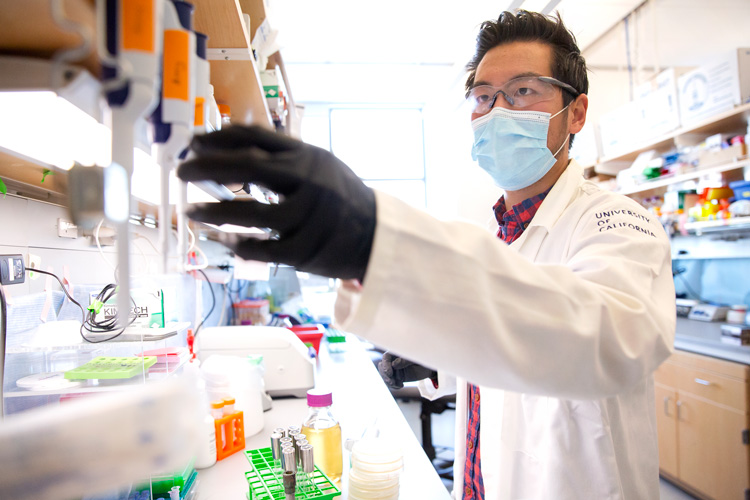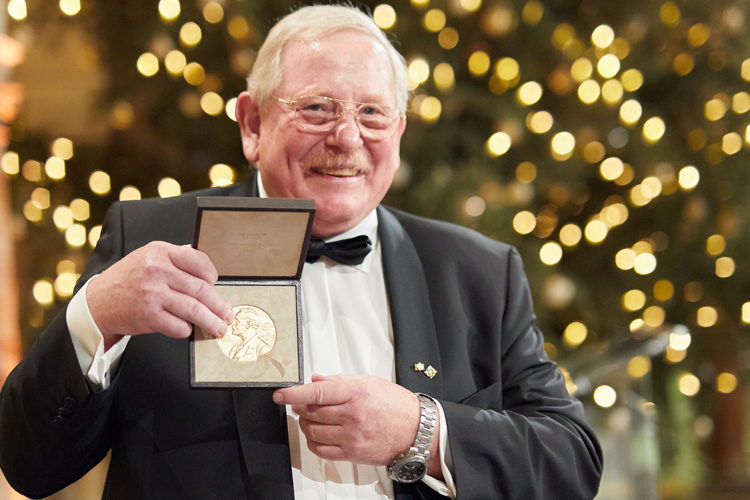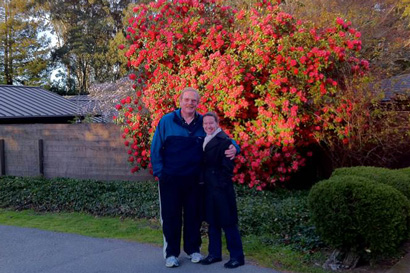High-powered, but supportive, environment draws students to Nobel winners’ labs
What's it like to work in the lab of one of the world's most lauded scientists? Ask a graduate student.
December 10, 2020

Amy Eggers (front) with fellow graduate students Joy Wang and Connor Tsuchida in Jennifer Doudna’s lab in the Innovative Genomics Institute at UC Berkeley. (UC Berkeley photo by Brittany Hosea-Small)
On the morning that University of California, Berkeley, professor Jennifer Doudna won the 2020 Nobel Prize in Chemistry, her first stop after a 7 a.m. press conference and subsequent media interviews was her campus lab in the Innovative Genomics Institute. When she exited the elevator with her family at 10:30 a.m., she was greeted by dozens of graduate students and lab staff, while several dozen current and former lab members joined in via Zoom.
“I am so proud of the lab, I’m so proud of Berkeley. It is an amazing day,” Doudna told them all.
Hoisting a glass of champagne, Doudna called out, in particular, former postdoctoral fellow Martin Jinek and the late Michael Hauer, a master’s degree student from Germany, who both were instrumental in the 2012 development of CRISPR-Cas9 gene-editing, for which she shared the Nobel Prize with Emmanuelle Charpentier.
“Being part of the experience and part of the project as it was unraveling — it is really a kind of scientific dream come true,” Jinek responded via Zoom from Switzerland, where he is an assistant professor of biochemistry at the University of Zurich. “I think … we could have done it only because of the way the Doudna lab works. It’s because they’re all such smart people with ideas, with help when it’s needed, with words of encouragement … (and) it’s largely thanks to you (Jennifer), because of the way you run the lab and because of how you recruit your people and the kind of supportive environment that you create. This makes all the fantastic science possible. If I can speak on behalf of the lab, it’s been incredible to spend time in your lab and incredible to work with all the people. And congratulations, and a big hand from all of us.”

On the day of her Nobel Prize win, Jennifer Doudna toasted current and former colleagues who had joined a celebration via Zoom from Europe and across the country. She is flanked by her son, Andrew. (UC Berkeley photo by Brittany Hosea-Small)
That kind of mutual appreciation is a hallmark of Doudna’s lab and a major draw for graduate students, according to current lab members.
“Even though she is a Nobel Prize winner and is an amazing scientist, she is still a very comfortable person to be around,” said Amy Eggers, a third-year graduate student in Doudna’s lab. When Eggers applied to UC Berkeley after a 10-year detour into marine biology at the Hawaiʻi Institute of Marine Biology, “I didn’t think I would get in. I am still amazed I am even in Jennifer’s lab. So, this is where I ended up, amazingly, and I love it. I couldn’t imagine doing something more awesome than I am doing now.”
Most graduate students rotate through three or more labs before making a decision where to land. Fourth-year bioengineering graduate student Connor Tsuchida remembered shooting Doudna an email, not really expecting a response, but receiving a reply within a couple of hours suggesting that they meet on a Saturday. He cleared his weekend schedule and joined the lab as a rotation student the following week.
“People always ask how busy she must be,” said Tsuchida, who is working on techniques for delivering CRISPR-Cas molecules into cells of the immune system. “Jennifer is certainly a very busy person and has got her hand in a lot of different pots, but I still get one-on-one time with her as often as I would like — though now the face time is Zoom — and I think, for the most part, she does that with all 30-something of us in her lab. I don’t think she sleeps much.”

Graduate student Connor Tsuchida at work in the Doudna lab in IGI. (UC Berkeley photo by Brittany Hosea-Small)
Both Eggers and Tsuchida echoed Jinek’s praise of Doudna’s skill in hiring smart people willing to work together to achieve success.
“The mentorship is great. People help you figure things out, it is not competitive, it is a very supportive environment,” Tsuchida said. “I think a lot of that is the way Jennifer has hired and recruited people and built that lab. Even though it is big, even though Jennifer is busy and only getting busier now, with more interviews and everything, it still proceeds pretty smoothly, for the most part, like a well-oiled machine.”
“Something that really attracted me to the lab was that she has put together a team of world-class scientists,” said Eggers, who is working on anti-CRISPR molecules to improve control over CRISPR editing. “It is a large lab, but it has this diverse array of expertise, biochemists, structural biologists, bioengineers, geneticists, bioinformaticians, people in laboratory management, and being able to work with such a powerful team is important for my graduate career. I am able to access these different resources and get these fresh perspectives on my research questions from all of these different members.”
Eggers noticed, before joining Doudna’s lab, that alumni — in particular, women — have gone on to highly successful careers in the biotech industry. Two women who hold Ph.D.s co-founded CRISPR-based startups: Rachel Haurwitz, who is now CEO of Caribou Biosciences Inc., one of the top CRISPR companies in the world; and Janice Chen, CTO of Mammoth Biosciences Inc., which is focused on CRISPR diagnostics and is now offering a rapid test for COVID-19. Another alum, Benjamin Oakes, obtained his Ph.D. from both Doudna’s lab and that of UC Berkeley’s David Savage, associate professor of molecular and cell biology. In 2018, Oakes and Doudna co-founded Scribe Therapeutics Inc., a company focused on CRISPR-based gene therapy.
“That was another thing that drew me to the lab — looking at people who have graduated and how successful they are and the women who have come out of the lab and have started their own companies,” said Eggers, who tried and failed to start her own company before deciding to go to graduate school. “It didn’t work out, it was not successful, but it was a good learning experience, and I play with the idea of doing it again in the future. Seeing the successes from Jennifer’s lab definitely influenced my decision to join.”
Genzel inherited Townes’ legacy
Doctoral students who worked with Reinhard Genzel, co-recipient of this year’s Nobel Prize in Physics, similarly treasure the time they spent in his lab during the decades when he was searching for evidence of a black hole at the center of the Milky Way Galaxy. That work really began when he came to UC Berkeley as a Miller Fellow in 1980 and started working with Charles Townes, who had won the 1964 Nobel Prize in Physics for the invention of the laser. Genzel was appointed a UC Berkeley professor of physics in 1981 and subsequently held a joint appointment at UC Berkeley and the Max Planck Institute for Extraterrestrial Physics, which he now directs, in Garching, Germany.

Reinhard Genzel, then a UC Berkeley assistant professor of physics, in his Birge Hall office with graduate student Dan Watson, circa 1984. (Photo courtesy of Andrew Harris)
“He is very strongly influenced by Charlie Townes,” said Andrew Harris, who obtained his UC Berkeley Ph.D. under Genzel in 1986 and worked another eight years with Genzel at the Max Planck Institute. “It was his experience with Charlie that shaped a lot of the way he (Genzel) looked at working with students and working on projects.”
Harris, a radio astronomer who is now chair of the astronomy department at the University of Maryland, College Park, said that “Townes’ approach resonated with Genzel, this idea that you bring people in, figure out what they are good at and let them loose. How they do it — let that become their passion.”
“He (Genzel) has a very strong feeling that individuals are important in science, and that you really need to promote individuals. That is partly Reinhard’s personality, but also very Townesian,” Harris said. “Townes was wonderful to work for, in many ways, because he had made his mark, he was very happy to push people forward. And Reinhard always does that, too. He is really good about making sure that people get recognition for what they are doing.”
Though he spent most of his time in Garching, where he supported a large lab, Genzel returned to UC Berkeley twice a year for a couple of months each time to interact with colleagues in the physics department and to mentor two or three UC Berkeley graduate students at a time. One former doctoral student who benefited from this transnational partnership was Kristen Griffin, now senior director of strategy at Northrop Grumman, an aerospace and defense company in San Diego.

Reinhard Genzel was presented with his Nobel Prize medal on Dec. 8 at the Bavarian State Chancellery in Munich, Germany. (Photo courtesy of the Nobel Prize foundation)
“I was instantly attracted to the work that he was doing,” said Griffin, who obtained her Ph.D. in 2010 with a thesis on galaxy evolution. “The magnitude of the kinds of questions that he was going after in such a disciplined way, together with his ability to think about the hard problems and really coach his students to identify and then prosecute really compelling research investigations, were very attractive to me.”
The skills she learned in Genzel’s Berkeley and Garching labs are critical today in her current job: she leads strategy development for Northrop Grumman’s joint all-domain command and control efforts, helping U.S. and allied governments connect people, platforms and systems across all organizations and domains.
“I think every day I use the skills … and the thought process that I learned while doing my Ph.D. with Reinhard: how to approach really complex problems, how to solve things that require advances in technical capability, as well as how you handle the data and manage information,” she said.
Nobelists who mentor future Nobelists
The fact that Genzel was mentored by a Nobel laureate, Townes, is not unusual. Nobel Prize winners tend to beget Nobel Prize winners. Doudna obtained her Ph.D. at Harvard University in 1989 working under Jack Szostak, who went on to share the 2009 Nobel Prize in Physiology or Medicine with former UC Berkeley scientists Elizabeth Blackburn and Carol Greider. And Doudna did postdoctoral work with Tom Cech, who had won the 1989 Nobel Prize in Chemistry. Randy Schekman, who shared the 2013 Nobel Prize in Physiology or Medicine, was mentored by Arthur Kornberg, who received the same prize in 1959.

When Randy Schekman won the Nobel Prize in Physiology or Medicine in 2013, his lab threw a party to celebrate him. Some wore fake mustaches in his honor. (UC Berkeley photo by Peg Skorpinski)
“I think it has to do with how you think about and attack a problem,” said Matt Shurtleff, who obtained his Ph.D. in Schekman’s lab in 2016. “If there is a roadblock in the work, Randy is amazingly good at coming up with a key experiment, a key insight, that gets you over that roadblock. The Nobel Prize winners I know of are very hands-off. You are working on a daily basis with a lot more independence than in a lot of other labs, where the PI (principal investigator) can be really involved in your daily progress. Randy, specifically, is really, really amazing at guiding a project without daily input.”
As Griffin noted, the skills learned while researching and writing a Ph.D. dissertation are transferrable broadly outside the world of academia. Samantha Dixon is completing her Ph.D. in physics with Saul Perlmutter, who shared the 2011 Nobel Prize in Physics. While refining brightness measurements of Type Ia supernovas — the distance measure Perlmutter and his colleagues relied upon to discovery dark energy — Dixon was also exposed to Perlmutter’s other passion, data science.
“I think Saul really prizes having this ability to go out and explore all sorts of different ways of approaching problems, and I think that is partially his motivation for his involvement with the Berkeley Institute for Data Science,” Dixon said. “I have also been involved in the data science world on the side; you can learn a lot from those tools in other fields and apply it to other research.”
Thanks to this introduction to data science, she was able to apply machine learning tools to the analysis of Type Ia supernovas for part of her thesis and will be using these skills in her next job at a San Francisco startup focused on using machine learning to translate speech to text.

Graduate student Samantha Dixon, who works with Nobel laureate Saul Perlmutter, at the Keck Telescope atop Maunakea in Hawai’i. (Photo courtesy of Samantha Dixon)
Her deep dive into data science would not have happened if she hadn’t gotten up the nerve to email Perlmutter after she head about the “relaxed” atmosphere of his Lawrence Berkeley National Laboratory lab.
“Saul is probably one of the nicest people I have ever met, just a very kind and understanding man,” Dixon said. “He was super excited and enthusiastic to have anybody come in and work on anything, so I just started coming to group meetings, and that was that.
“Saul recognizes that you are much more productive if you can focus, and you are not overworked. Overworking leads to a slowdown in productivity. It is kind of rare to find professors who have internalized that lesson, so when I found it, I was like, ‘This is where I want to be.’”
Fun outside the lab
While science is the focus of these graduate students’ lives, sometimes it’s extracurricular activities that remain their most memorable moments.

Genzel and Kristen Griffin during an outing in Berkeley in the late 2000s. (Photo courtesy of Kristen Griffin)
Harris recalled many days when Genzel would come into his office and hint that the weather tomorrow was likely to be nice and would say, “It would be a waste not to be in the mountains.” Genzel was an avid hiker, bicyclist and tennis player.
“When I was with the group in Germany,” Griffin said, “he would invite me out on what the team called ‘little mountain walks,’ which were hikes up the Alps in southern Germany and Austria. All the people who wanted to join from his group would spend the day hiking and seeing wonderful sights. He always picked sites with great views.”
She also recalled food shopping for exotic ingredients — Genzel was “a passionate and very gifted chef,” she said. Harris recalls the Christmastime cookie parties that Genzel hosted.
In spite of the camaraderie, the stimulating and often cutting-edge environment and the career boost that comes from working with a Nobel laureate, graduate students, too, often find their labs off-putting, Shurtleff said.

Saul Perlmutter accepting the Nobel Prize in Physics in 2011.
“I loved working in Randy’s lab, but sometimes people will tell students to stay away from Nobel Prize winners’ labs — I hear that all the time,” said Shurtleff, who now works at the startup Lycia Therapeutics in a position that Schekman helped him find. “I get a lot of Berkeley grad students emailing me saying, ‘What’s it like to work in that lab? I don’t know if I should rotate.’ And I tell them, ‘You should, it is an incredible experience. And it pays off in the long run, too.’”
Dixon agreed.
“The big thing that led me down this path was taking that leap and not being intimidated by what you think a professor might be like because they had won a Nobel,” Dixon said. “Make the jump and say, ‘I can do this,’ and see where that leads.”
FURTHER READING
- UC Berkeley’s Reinhard Genzel awarded Nobel Prize in Physics (Oct. 6, 2020))
- UC Berkeley’s Jennifer Doudna wins 2020 Nobel Prize in Chemistry (Oct. 7, 2020)
- Randy Schekman awarded 2013 Nobel Prize in Physiology or Medicine (Oct. 7, 2013)
- Saul Perlmutter awarded 2011 Nobel Prize in Physics (Oct. 4, 2011)